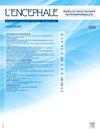Health professional's representations of parents with illnesses or disabilities
IF 1
4区 医学
Q4 NEUROSCIENCES
Encephale-Revue De Psychiatrie Clinique Biologique et Therapeutique
Pub Date : 2025-02-07
DOI:10.1016/j.encep.2024.11.013
引用次数: 0
Abstract
Objective
The purpose of this study is to analyze professionals’ representations of parents with mental and/or physical health conditions.
Methods
We interviewed 51 health professionals and social workers. Using an inductive approach and NVivo software, we proceeded to a qualitative analysis. To comprehensively examine the content of professionals’ responses, each coding unit was assessed according to its theme (representation of the family, representation of the condition, actions on representations) and valence (negative, cautious, positive or neutral tone).
Results
Three major themes emerged from the interviews: 1 – Family representations: The child is vulnerable and negatively impacted by parents with mental and/or physical health conditions. This impact is embodied mostly by the mother, the father being seen as a subsidiary parental function or a potential intermediary. The extended family is invested as a protective factor. 2 – Condition representations: Physical impairment is more positively viewed than mental health conditions, psychosis being particularly negative; physical impairments are seen as more compatible with qualitative parenthood. 3 – Actions on representations: Becoming aware of their representations and reflecting on them allow professionals to think of the unique character of each situation and to put their representations into perspective; time and exposure to parents with health conditions leads them to revise their most negative representations.
Conclusion
While the results are broadly in line with the literature, this study investigates in detail the previously unexplored point of view of professionals. Revealing their representations may contribute to improving practices and care provided to families with mental and/or physical health conditions.
健康专业人员为患病或残疾父母所作的陈述。
目的:本研究的目的是分析专业人员对父母有心理和/或身体健康状况的表述。方法:对51名卫生专业人员和社会工作者进行访谈。使用归纳方法和NVivo软件,我们进行了定性分析。为了全面检查专业人员的回答内容,每个编码单元根据其主题(家庭表征、条件表征、表征行为)和效价(消极、谨慎、积极或中性语气)进行评估。结果:访谈中出现了三个主要主题:1 -家庭陈述:儿童是脆弱的,并且受到父母精神和/或身体健康状况的负面影响。这种影响主要体现在母亲身上,父亲被视为辅助的父母职能或潜在的中介。大家庭是一种保护因素。2 -状况表征:人们对身体缺陷的看法比对精神健康状况的看法更为积极,对精神病的看法尤其消极;身体缺陷被认为更符合定性亲子关系。3 -对陈述的行动:意识到他们的陈述并对其进行反思,使专业人员能够思考每种情况的独特性,并将他们的陈述置于正确的角度;时间和接触有健康问题的父母会使他们改变自己最消极的看法。结论:虽然结果与文献大致一致,但本研究详细调查了以前未探索的专业人士的观点。披露他们的陈述可能有助于改善对有精神和/或身体健康状况的家庭的做法和护理。
本文章由计算机程序翻译,如有差异,请以英文原文为准。
求助全文
约1分钟内获得全文
求助全文
来源期刊
CiteScore
4.60
自引率
7.40%
发文量
162
审稿时长
6-12 weeks
期刊介绍:
Une revue française de renommée internationale.
- Un comite de rédaction représentant tous les aspects de la prise en charge psychiatrique du patient.
- Une sélection rigoureuse d''articles faisant l''objet de plusieurs expertises.
- Des travaux d''auteurs et de chercheurs de renommée internationale.
- Des indexations dans les grandes bases de données (Current Contents, Excerpta Medica, etc.).
- Un facteur d''impact qui témoigne de la grande notoriété de la revue.
La tribune des publications originales de haut niveau.
- Une très grande diversité des sujets traités, rigoureusement sélectionnés à travers des sommaires dynamiques :
- des éditoriaux de médecins référents,
- une revue de presse sur les actualités internationales,
- des articles originaux pour approfondir vos connaissances,
- des mises au point et des cas cliniques pour engager votre réflexion sur les indications et choix possibles au travers de mises en situation clinique,
- des dossiers thématiques pour faire le tour d''une question.
- L''actualité de l''AFPB : L''Encéphale publie régulièrement des comptes rendus de l''Association française de psychiatrie clinique.

 求助内容:
求助内容: 应助结果提醒方式:
应助结果提醒方式:


